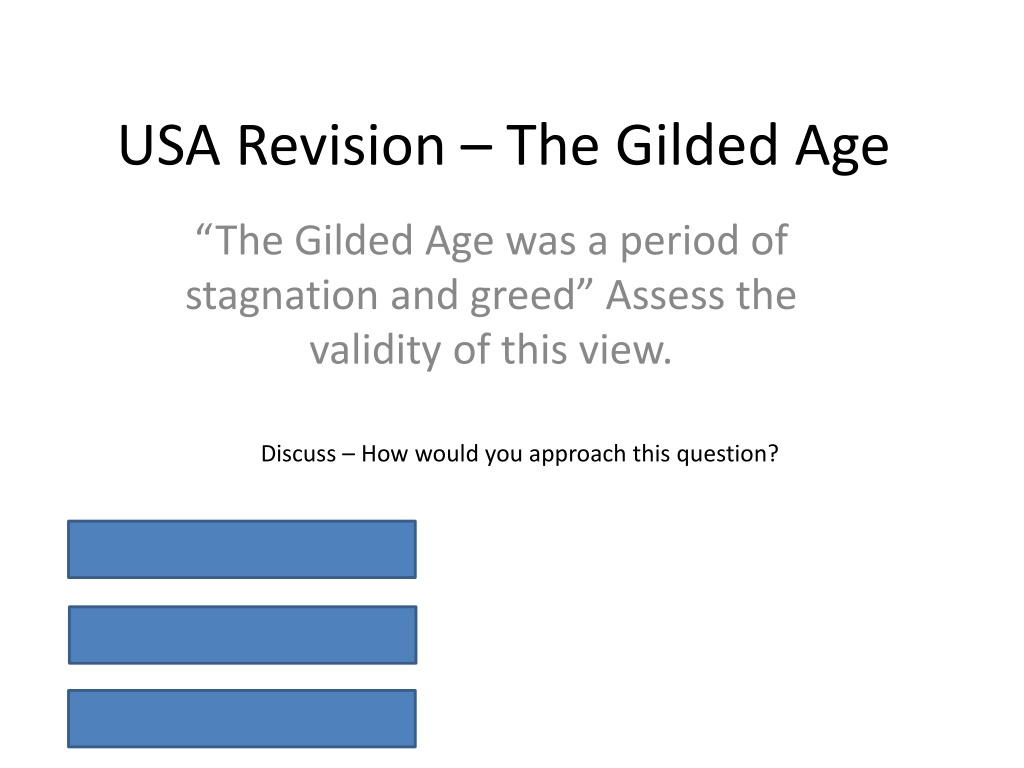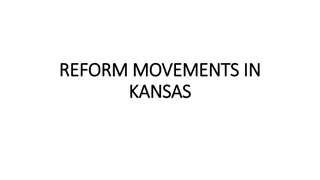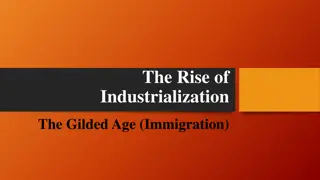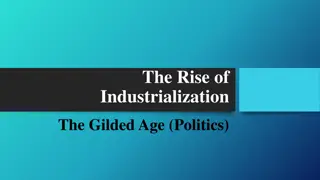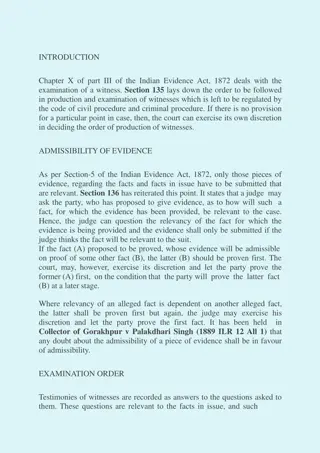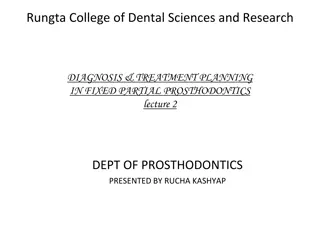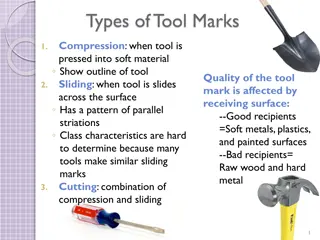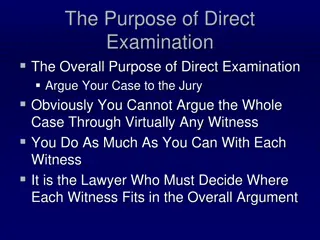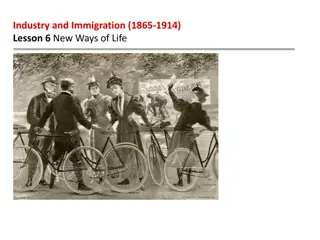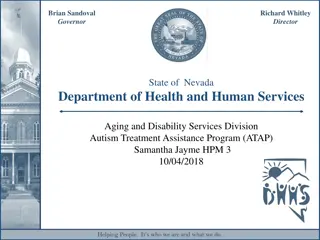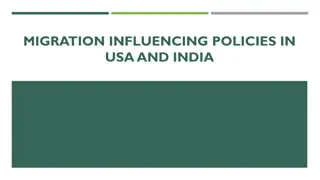Examination of the Gilded Age in the USA
The Gilded Age in the USA was marked by political conservatism, economic growth driven by robber barons and corporations, and social challenges including urbanization, immigration, and nativism. The Republican Party's hegemony was influenced by big business support, but also faced opposition due to various factors. The period set the stage for future progressive reforms.
Download Presentation

Please find below an Image/Link to download the presentation.
The content on the website is provided AS IS for your information and personal use only. It may not be sold, licensed, or shared on other websites without obtaining consent from the author. Download presentation by click this link. If you encounter any issues during the download, it is possible that the publisher has removed the file from their server.
E N D
Presentation Transcript
USA Revision The Gilded Age The Gilded Age was a period of stagnation and greed Assess the validity of this view. Discuss How would you approach this question?
Politically Yes/Agreement No/Disagreement Republican Hegemony since 1865. Most Presidential candidates were moderate. The Solid South and influence of Democratic Redeemers limited Reconstruction in 1870s i.e. Amnesty Act allowed Southern Civil War leaders to resume office, 1870 CR Bill took five years to pass, Segregation grew etc. Hayes Compromise 1877 allowed radical Reconstruction to end with the removal of the army from the South. Only 5 swing states out 35 (California, Indiana, Ceonnecticut, New york and Nevada). 14 safe Democratic states v 16 Republican. Spoils system meant powerful parties/organisations could exchange patronage for support which limited challenge i.e. Big Business support of Republican candiidates, The Republican Stalwart opposition led by Roscoe Conkling to the Republican President Hayes attempts to reform the Spoils system i.e. such as banning Federal employees from making political Contributions. Political Corruption i.e. Tamany Hall ($3 million plasterer contract), the Tweed Ring and the New York Customs House and Roscoe Conkling. Limited social/economic intervention business largely unregulated due to laissez-faire/corruption, allowed growth of nativism (particularly against Chinese i.e. Arthur and 1882 Exclusion Act), no support of labour i.e. Hayes and the 1877 Railroad Strike, Cleveland vetoed Veterans Pension Bills and the Texas Seed Bill. Because he wanted to reduce the role of Federal Government. 78% voter turnout. Elections were very close i.e. Garfield won by just 10,000 votes! The Mugwumps a group of Republicans lent support the deomcrat Cleveland All presents did something to reduce patronage and corruption Hayes appointed Carl Schurz to reduce role Patronage and Spoils System in fed. Gov., Garfield eventually beat Conkling s control over the New York Customs House and reformed it as well as the Post Office fake Star Routes, Arthur passed the Pendleton Act 1883 introducing meritocracy to the fed. Gov. which effectively began to end the Spoils System, even the conservative Democrat Cleveland supported meritocratic appointments and reduced size of bloated Federal departments Arguably what happened in this period led to a later period of more Progressive Presidents. Arguably the lack of Federal intervention allowed period of economic growth
Economically? Yes - Robber Barons, Cartels and Corporations i.e. Yes Republican support of protectionism and high tariffs i.e. Yes - Treatment of Labor unions i.e. Yes - farmers issues i.e. No - Growth and Technological Progress which laid foundations for future.
Socially? ? +/- Urbanisation and Living Standards i.e ? +/- Westward Expansion i.e ? +/- Immigration and Nativism i.e Yes - Race Relations i.e ??? But Issues led to Progressive era!!
Similar Question To what extent was the support of big business the main reason for the Republican hegemony 1865-1912? Yes it was very important but actually it also threaten the Party at times It was also not just because of big business as this was also a period of conservatism although it was perhaps actually a more contested period than the hegemony reflects . No it wasn t just this because political demographics and the limitations of Democrat/3rd party opposition also helped the hegemony
Revision - Progressive Era To what extent was Wilson the most progressive President in the period 1890-1920? To what extent was the Regulation of Big business the main impact of the Progressive Era? Internal divisions were the main threat to the Republican Party s control in the period 1865-1912 Assess the validity of this view.
Factors leading to the Progressive Era 1. Creation of the Populist Party a and its impact on the 1892 elections Westward Expansion had put 430 million new acres under cultivation, technology and new fertilizers had increased productivity (1 man in 1900 could produce what 20 had in 1860), also high debts linked to modernisation as well as foreign competition and tariffs limiting exports led to a crisis in agriculture at a time of over production and falling prices. Farmers responded by creating the farmers Alliance that provided credit and encouraged cooperatively owned mills etc. but this was enough and neither Democrats or Republicans were seen to be on their side so in 1892 they formed a Political Party to run against the bankers, middlemen and railroad tycoons they blamed for their woes. The Populists wanted railroads to be government controlled, banking regulation to tackle high interest rates, an expanded silver (rather than gold backed) coinage to increase the amount of money in the economy and the creation of a subtreasury to lend farmers money against their crop so they could wait to sell it when prices were advantageous. The initial impact of the Party was to take the farmers votes away from both main parties, especially the Democrats. In 1896 the Democrat Bryan managed to win the backing of the Populist Party for the Democrats. This effectively ended the movement when he was beaten by McKinley and the Yukon Gold Rush and poor European harvests led to a small revival in agriculture.
Factors leading to the Progressive Era 2. Impacts/issues raised or created by the Gilded Age Frustration with political corruption led to awareness of need for change i.e. Need to regulate the power of Robber Barons, Corporations and Trust led to need for change i.e. Concern for the wealth gap/social problems linked to urbanisation, industrailisation and immigration led to need for change i.e. Growth of organised Labor led to a need for change i.e. Growth of the USA i.e. 12 new States 1865 -1912 End of the frontier i.e.
The Progressive Presidents Grid Analysis/Revision NB. Modern Republican and Democrat parties very different!
McKinlay 1896-1901 1897 Dingly Tariff (increase) Currency Act backing gold standard aided by Yukon Gold Rush). Defeated Democrat/populist candidate Bryan in 1896 thanks to Democrat divisions created by Bryan backing Silver coinage (populist policy) over wishes of bourbon industrial democrats in the North east. Won Spanish-American War.
Teddy Roosevelt 1901-1908 Anti-Trust Act of 1890 enforced. Northern Securities TR authorised his attorney general to start proceedings for unfair practices against Northern Securities (a holding company) which brought him up against Rockefeller and J P Morgan and led to the dissolution of the company. This success led to 44 other successful prosecutions. 1903 Commerce and Labor Act created the dept. of commerce to regulate businesses t prevent price fixing or monopoly. 1906 Hepburn Act gave federal authorities the power to inspect the accounts of Railroad companies and set maximum prices they could charge. 1906 Pure Food and Drug Act ended food adulteration and another led to meat inspection. Supported workers over owners in labor disputes i.e. Anthracite Coal Strike of 1902. Threatened to send in federal troops to work the mines in support of strikers leading the business owners to give a wage rise and 9 hour day. Created many federal reserves to protect forests and organised the National Conservation Conference in 1908. Panama canal Open door policy re. china Roosevlt Coroally added to Monroe doctrine Settled the Alaska border dispute Mediated end of russ-Japnaese war. Not elected in 1901 was not main republican choice, was VP when McKinlay was assassinated and had been there to balance the ticket with his more progressive outlook. Opposed Taft for lack of progressivism in 1912 splitting Republican party (lost nomination so set up national progressive Party as 3rd party candidacy).
Taft 1909- 1912 80 Anti Trust Suits. 8 hour day for Federal Employees (not everyone!) Interstate commission to regulate railroad prices. Introduces federal income tax and corporation tax. Dollar diplomacy in Latin America/China Taft s failure to pursue further reform such as lowering tariffs (Taft failed to veto the Payne-Aldrich Act) and take further action on conservation led Roosevelt to set up the Progressive Party which split the Republican Party allowing Wilson to win the 1st Democrat presidency for 50 years. Socialist candidate Eugene Deb votes doubled to nearly a million from 1904 1912, highlights growth of socialism in period.
Wilson 1912-1920 The New Freedom Banking Reform Federal Reserve to support and regulate banks More Anti-Trust legislation i.e. Clayton Act Underwood Tariff (lowered) Expanded Income Tax/Progressive taxation. Child Labour Act meant to regulate child work but found unconstitutional! Workman s compensation act (sick pay etc. for federal employees) 8 hour day for railroad workers 17th Amendment 19th Amendment National guard used to break up Ludlow Strike in 1913! WWI Defeated in 1919 over League of nations/return to Normalacy
Impact - Success of the era? Successes Limitations
The progressive era had a fundamentally positive impact on all America To what extent do you agree with this statement? Topic Sentence Theme/Broad argument for paragraph Politically mostly agree Big Points R+D (Key Examples) Analysis if appropriate (However ) 17th Amendment direct election of senators breaking the influence party/corporate sponsors 19th Amendment votes of women 1. More political power to people Not for AA Still some corruption/influence 2. More federal intervention/executive action Anti trust acts -44/30/Clayton Act National Roosevelt Income Tax Taft and Wilson Banking Act Child labour act over ruled Taft/Roosevelt split 3. Summative sentence Final view focus on the question how far???
Topic Sentence Theme/Broad argument for paragraph Some but not broad across all society Big Points R+D (Key Examples) Analysis if appropriate (However ) 1. Regulation Anti-Trust Food and drugs act Hepburn Act/Interstate commission Still robber barons 2. Labour relations Anthracite, 8 hour day for some Ludlow No working day of 8 hours for all 3. Growth Massive value Not for farmers Summative sentence Final view focus on the question how far??? Yes but limitations
Topic Sentence Theme/Broad argument for paragraph Not enough Big Points R+D (Key Examples) Analysis if appropriate (However ) 1. Partly for workers 8 hours days, workmans compensation act WC Act not for all 2. Minorities AA WEV Dubois/Booker T. Washington Wilson promised support to NAACP but then failed to support lynching legislation! 3. Immigrants Summative sentence Final view focus on the question how far??? No enough
Model Paragraph I would agree with the statement that progressive era did mark a fundamental change in politics. This is because the government had been mainly laissez-faire up until about 1900 allowing big businesses and rich individuals, such as robber barons like Rockefeller, to control political parties through donations and corruption. Roosevelt, Taft and Wilson were all much more progressive as they used the power of the federal government to intervene more in the way the country was run. For example they used the Sherman Anti-Trust Act of 1890 to tackle unfair practices such as monopolies and price fixing. In the Northern Securities prosecution brought by Roosevelt the likes of J P Morgan and Rockefeller were forced to dissolve this company that unfairly controlled many railroads. This led to 44 more successful prosecutions by him and another 80 under Taft. Furthermore Clayton Act However Second point Overall politically fundamental change took place but it did not resolve all issues.
